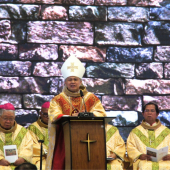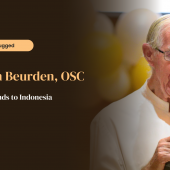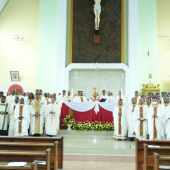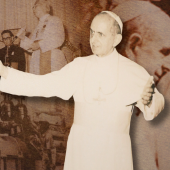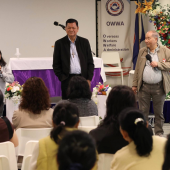Indonesian youth start organic farming to move towards environmental sustainability
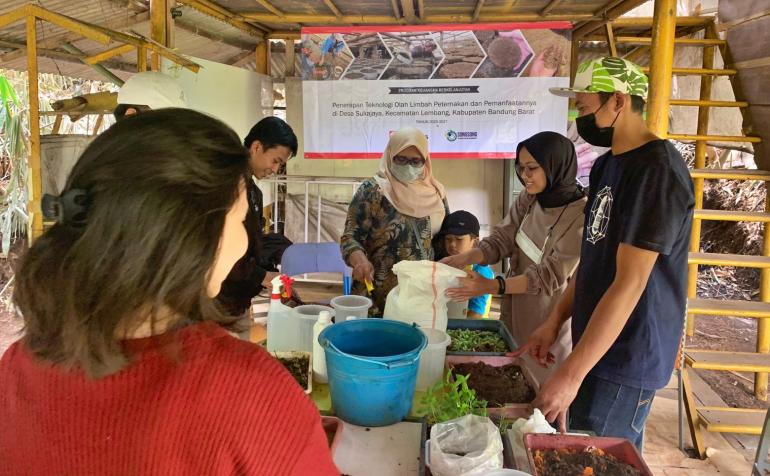
Indonesian Catholic youth is pursuing organic farming to empower the community and move towards environmental sustainability.
"When one hears the word 'organic', what comes to one's mind mostly are livestock, vegetables, fruits that are cultivated without using any chemical products," says Hendro Prasetya Wibowo, a 27-year-old from Indonesia.
Wibowo says, "organic farming is more than that. It for the care of the environment and empower a community towards sustainability." Wibowo is from Bandung, West Java, about 240 km from Jakarta, the capital of Indonesia.
"I started working in this field in 2019. The idea of bio compound came from Eco Learning Camp Bandung, which my father founded," Wibowo told Radio Veritas Asia.
He graduated from Industrial Engineering, Sepuluh Nopember Institute of Technology (ITS), Surabaya, capital of East Java province.
After completing his Master of Science in Entrepreneurship Innovation Management from Nottingham University, the United Kingdom, Wibowo initiated an ecological project involving the local community based on organic waste processing, organic agriculture, and livestock.
He promoted bio-compound, an active microbial solution with many benefits, as a biological decomposer to restore the food chain in the soil. The microbial solution decomposes organic waste in a day.
"With this method, the gas produced by organic waste is reduced. It eliminates odors, and managing waste only takes a day," said Prof. Wanjat Kas-Tolani, an environment expert from the University of Education Indonesia, Bandung, capital of West Java province.
Wibowo aims to do good for humanity and care for the environment.
"My main goal of organic farming is the welfare of a sustainable community which pays attention to the environmental aspects," he said.
As a Catholic youth, I want to spread the message of ecological conversion following the encouragement of Pope Francis in 'Laudato Si', Wibowo said.
Wibowo, a parishioner of St. Laurensius Church, Bandung, said what he is doing is meant to encourage others to care for the environment for the present and future generations.
Presently, Wibowo manages about 20 hectares of agricultural land and livestock. He is not alone in the initiative but has a team of 20 others, including Christians and people of other faiths.
"We grow organic vegetables and fruits; besides that, we also raise fish, chickens, and cows," he said. Wibowo and his colleagues use recycled waste as fertilizer.
"What is special about our agricultural and livestock products is bio compound. It is an ecological solution to problems in society and the environment," he explained.
Wibowo encountered obstacles like self-interest in developing his business, as people showed less interest in working together. He has a personal approach to overcome the difficulty.
Wibowo provides training programs for those who are interested and willing to learn bio compounds and organic farming.
"Every weekend, we hold a waste management workshop," affirms Wibowo. "In this training, participants are not forced to spend money, especially those who cannot afford it."
The training is free, but he encourages those who can pay to contribute.
Wibowo spent many resources to begin this project, but the yields of vegetables, fruits, and livestock give him a sense of fulfillment. The harvests are sold in the market, and he has many faithful customers.
He hopes that in the future, more people can embrace organic farming. Wibowo plans to collaborate with them sharing his experience and expertise.
"Agriculture and farming are identical with dirt and less promising source of income. But the young generation can change this mindset," explained Wibowo.
Agriculture is a potential industry in Indonesia with its tropical climate. Anyone can begin at any time, he said. - Emiliana Saptaningsih
Radio Veritas Asia (RVA), a media platform of the Catholic Church, aims to share Christ. RVA started in 1969 as a continental Catholic radio station to serve Asian countries in their respective local language, thus earning the tag “the Voice of Asian Christianity.” Responding to the emerging context, RVA embraced media platforms to connect with the global Asian audience via its 21 language websites and various social media platforms.









